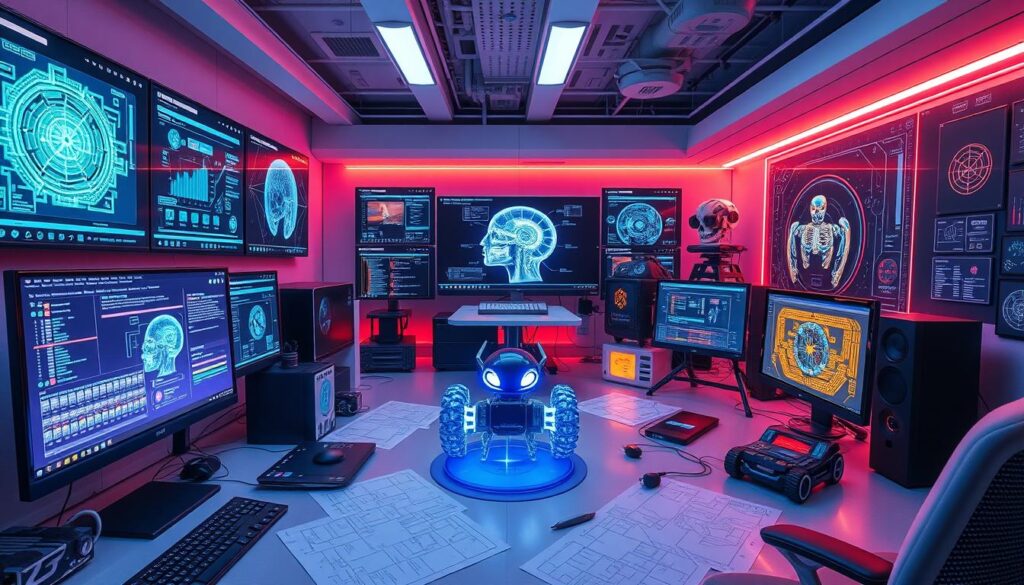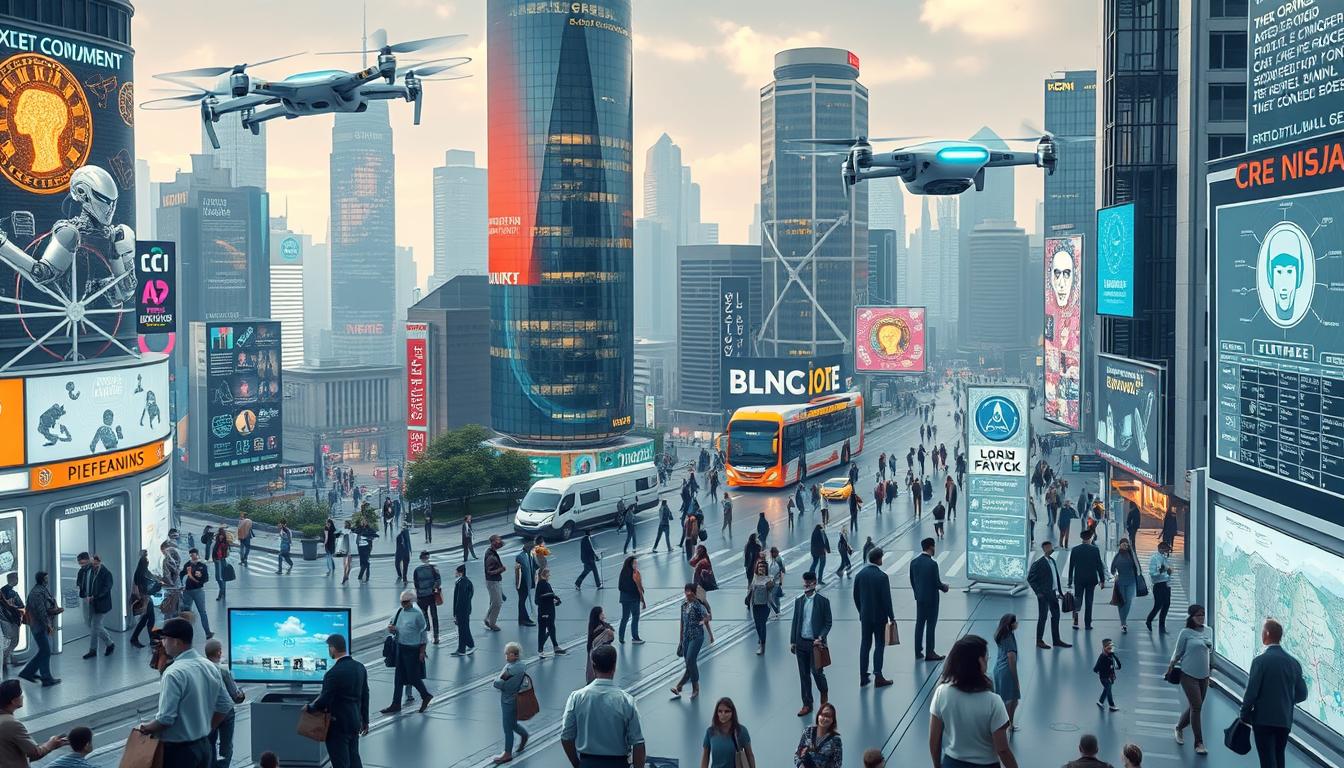Did you know that by 2030, up to 375 million workers worldwide may need to switch occupations or acquire new skills due to the impacts of automation and AI1? This is a huge change happening in the job market, thanks to AI. As AI technology gets more integrated, 66% of tech companies are now using skills-based hiring2. This is changing how we find jobs.
By 2025, AI is expected to create 97 million new jobs but will also displace 85 million jobs globally1. This will change the job market a lot. It’s important for professionals to learn both technical and soft skills to stay competitive and relevant in this changing workforce.
Key Takeaways
- 375 million workers may need to switch occupations or learn new skills by 2030 due to AI.
- AI is set to create 97 million new jobs by 2025 while displacing 85 million jobs.
- Skills-based hiring is a growing trend among tech companies.
- Professionals must adapt to the evolving landscape of the AI job market.
- Collaboration between humans and AI will be essential for future job success.
Understanding AI Jobs and Their Impact on Employment
The world of work is changing fast. Knowing about AI jobs is key to understanding the future of work. These jobs involve creating, using, and fixing systems that use artificial intelligence. With more companies using AI, these jobs are becoming more important.
What Are AI Jobs?
AI jobs cover a wide range of roles that use artificial intelligence. Tasks can include making machine learning algorithms and finding useful insights in data. A 2013 study by the University of Oxford says about 47% of US jobs could be automated by AI in the next 20 years3. It’s important to learn about these jobs for your future career.
Types of Roles in AI
There are many AI careers to choose from. Some common ones are:
- Data Scientists
- Machine Learning Engineers
- AI Researchers
- AI Ethics Specialists
- Human-Machine Teaming Managers
These jobs need technical skills and understanding of AI’s impact on industries. AI could change about 300 million jobs worldwide3. This change shows how important it is for AI professionals to keep learning.
Skills Required for AI Positions
To do well in AI jobs, you need certain skills. Important ones include:
- Programming Proficiency: Knowing Python and R is key for working with data and algorithms.
- Analytical Thinking: Being able to understand and make sense of complex data is crucial.
- Communication Skills: Being able to share complex ideas with teams is important.
- Problem-Solving: Being good at solving tough problems in new ways is essential.
The World Economic Forum 2020 Future of Jobs Report says skills like analytical thinking and problem-solving are key for the AI job market4. As companies use more AI, the need for these skills will only grow.
The Growing Demand for AI Professionals
Technology keeps moving forward, leading to more jobs in AI. AI is now used in healthcare, finance, and manufacturing. This shows how AI helps make things better and more efficient. Companies want people who know AI, showing a big change in the AI job market.
Industry Trends Driving AI Adoption
More companies are using AI, planning to spend over 5% of their digital budgets on it. A McKinsey report says 72% of companies use AI, showing it’s key in making big decisions. AI jobs are growing fast, with a 74% increase in the last four years56.
Global Perspectives on AI Job Growth
In the U.S., AI startups have doubled from 2017 to 2022. This shows how fast AI is growing. AI jobs are expected to grow by 21% from 2021 to 2031, with California and New York leading56. With new jobs and job losses, knowing AI is key for job security.

In the future, jobs in AI will be in high demand. Positions like machine learning engineers can earn up to $251,000. To stay ahead, workers need to keep learning AI skills5.
Essential Skills for a Career in AI
To do well in AI, you need a mix of technical and soft skills. These are key for handling AI’s complex tasks and filling the talent gap.
Technical Skills: Programming and Data Analysis
AI careers require knowing programming languages like Python, R, and Java. These skills help build strong AI models. Data analysis is also crucial, as AI uses data for learning and making decisions.
You should know how to work with data tools like Pandas and NumPy. Knowing frameworks like TensorFlow or PyTorch is also important. The need for these technical skills is on the rise, promising a good future for AI careers.
Soft Skills: Communication and Problem-Solving
Soft skills are just as important as technical ones in AI careers. Good communication helps explain AI ideas to others. Problem-solving skills are also key, as AI work comes with unique challenges.
Being creative and critical helps in innovating with AI. It’s important to balance these skills to meet the industry’s needs. Over 60% of businesses struggle to find AI talent like Machine Learning Engineers and AI Data Scientists, showing the need for diverse skills required for AI positions7.
| Role | Average Salary (USD) | Growth Forecast (2022-2032) |
|---|---|---|
| AI/ML Engineer | $114,000 | 35% for Data Scientists |
| Data Scientist | $96,000 | 35% Growth |
| AI Research Scientist | $120,000 | 35% Growth |
| Robotics Engineer | $99,000 | 26% Growth for Software Engineers |
| AI Product Manager | $113,000 | 26% Growth |
Developing a blend of technical and soft skills is crucial for anyone aspiring to thrive in the evolving landscape of AI.
Navigating Career Paths in AI
Starting a career in AI opens up many doors, especially for beginners. Many companies are looking for people with AI skills. As AI grows, it shapes both education and careers.
Only 33% of employers think new graduates are ready for jobs, showing the need for hands-on experience and training9.
Entry-Level Opportunities in AI
Internships, data analyst jobs, and AI project assistant roles are great starting points. They help you learn and gain real-world experience.
12% of recruiters are now creating AI-related jobs, showing the demand for skilled people9.
Transitioning from Other Fields to AI
When moving to AI from another field, highlight your transferable skills. Skills like analysis, software development, and a love for tech are key.
Upskilling, like getting certifications or taking online courses, prepares you for the AI world. New AI roles like data privacy officers and AI ethicists show the wide range of opportunities10.

The Role of Education in AI Careers
Education is key for starting a career in AI. As AI grows, so does the need for specific skills. You’ll need a degree in computer science, data science, or similar fields to grasp AI basics.
Many universities now have programs focused on AI and machine learning. Education initiatives highlight the importance of matching skills with AI adoption in workplaces.
Degree Programs and Certifications
Getting a degree in AI is a big step towards getting a job. Universities are adding AI and data science to many courses. This prepares students for a future with AI11.
AI certifications from trusted sources show your dedication. They cover key areas like machine learning and data analysis. These are highly sought after in the job market12.
Online Learning Platforms for AI Skills
Online platforms are great for learning AI skills on your own schedule. Sites like Coursera, Udacity, and edX offer detailed courses. They include practical projects and real-world examples13.
With technology changing fast, keeping up with education is crucial. Online learning lets you improve your skills while managing work and life.
Networking and Building Your AI Community
Building a strong network in the AI field is key to moving up in your career. Networking in AI can open doors to new opportunities and resources. Being part of AI professional groups boosts your knowledge and connects you with industry leaders.
Joining AI Professional Groups
Being part of AI professional groups is a smart move. It lets you meet people with similar interests and learn more. Networking is important for career growth, helping you find jobs and get advice from others14.
Groups like the Association for the Advancement of Artificial Intelligence (AAAI) or local meet-ups are great. They help you find new chances to work together.
Attending AI Conferences and Workshops
Going to AI conferences and workshops keeps you up-to-date with new ideas. Events like NeurIPS and ICML are perfect for sharing knowledge and meeting people. Talking to different professionals encourages creativity and helps build supportive communities14.
Being open to diversity through networking makes you more competitive. It helps you stay ahead in a fast-changing job market15.

| AI Job Role | Average Salary |
|---|---|
| Data Scientist | $127,000 |
| Machine Learning Engineer | $123,000 |
| Software Engineer | $119,000 |
| AI Engineer | $113,000 |
| Data Engineer | $104,000 |
| Robotics Engineer | $99,000 |
Using strategies like going to events, joining online groups, and looking for collaboration can boost your networking. It helps you succeed in the competitive AI job market14.
The Future of Work: AI and Job Automation
Artificial Intelligence (AI) is changing jobs in many fields. It automates simple tasks and boosts human skills. People who adapt will take on roles that need creative thinking and problem-solving.
This shift will lead to more teamwork between humans and AI. It will make work more productive and innovative. Understanding AI’s role in job changes is crucial.
How AI is Reshaping Traditional Roles
AI and automation are changing jobs fast. New jobs like AI trainers and maintenance specialists are appearing. Traditional roles are evolving (see source)16.
For example, self-checkout machines have reduced the need for cashiers. This shows AI’s impact on jobs (see source)16. There will be more jobs in AI ethics, policy, and governance, especially in healthcare (see source)16.
Opportunities for Collaboration Between Humans and AI
In the future, working with AI will be essential. AI can automate and augment tasks, improving productivity (see source)17. For instance, a real estate agent used AI to make property listings much faster, showing AI’s efficiency (see source)17.
As AI use grows, so will the need for data science, machine learning, and cybersecurity skills (see source)16. To keep up, workers will need to keep learning (see source)16.

Preparing for AI Job Interviews
Starting your journey to prepare for AI interviews is key. You need to know how they’re different from regular interviews. With AI becoming more common in hiring, learning about AI interview questions is crucial. By 2024, about 40% of companies will use AI for interviews18.
Understanding the questions about algorithms, data structures, and machine learning is vital. This knowledge will help you stand out.
Common Interview Questions in AI
AI interviews will mix technical and behavioral questions. You’ll face topics like:
- Your experience with programming languages, especially Python, R, and Java.
- Knowledge of machine learning algorithms and frameworks.
- Explaining your AI projects and the challenges you faced.
- Questions on problem-solving and teamwork.
With AI making hiring decisions for 15% of companies, showing your knowledge is key18. Using tools like Prepper from Adzuna can improve your skills19.
How to Showcase Your AI Projects
Highlighting your AI projects is crucial. Talk about the outcomes and the methods you used. GitHub is great for showing your work and getting feedback.
Being able to explain your project shows your knowledge and communication skills. This is important in AI interviews.

In this competitive field, using the right keywords is important. AI tools rank candidates based on these terms. So, research job descriptions and practice answering questions. Remember, AI interviews can make you seem more rigid, affecting how you present yourself18.
Adapting to the Evolving AI Landscape
In today’s fast world, keeping up with AI changes is key to success. You need to read industry news, research, and forums. A World Economic Forum report says upskilling and reskilling are vital for the future workforce20.
Stay current with the latest to stay ahead in this changing field.
Staying Updated with AI Innovations
Learning about AI is a must. Companies like J.P. Morgan and Amazon are using new tech, creating a need for tech skills21. Training and certifications in machine learning and data analysis are crucial.
These skills are important as automation changes the job world.
Continuous Learning and Professional Development
Platforms like Coursera and Udacity have great AI and tech courses21. Lifelong learning and professional growth are essential. The World Economic Forum’s Future of Jobs Report 2023 shows cognitive skills are becoming more important20.
By adapting to AI changes, you can grab new opportunities and handle future job roles.
FAQ
What are the main types of AI jobs available in the market today?
What skills are essential for a successful career in AI?
How can I transition from a different career into AI?
What education is required to pursue a career in AI?
How important is networking in the AI field?
What trends are driving the demand for AI professionals?
How can I prepare for an AI job interview?
What role does continuous learning play in a career in AI?
What are some common career paths in AI?
What impact is AI expected to have on traditional job roles?
Source Links
- AI and the Workforce: Preparing for the Jobs of the Future | Thoughtful – https://www.thoughtful.ai/blog/ai-and-the-workforce-preparing-for-the-jobs-of-the-future
- How AI And Skills-Based Hiring Are Reshaping The Job Market – https://www.forbes.com/sites/karadennison/2024/10/14/how-ai-and-skills-based-hiring-are-reshaping-the-job-market/
- 4 Ways AI Impacts the Job Market & Employment Trends – https://onlinedegrees.sandiego.edu/ai-impact-on-job-market/
- How Is Artificial Intelligence Impacting the Job Market? – https://www.linqto.com/blog/how-is-artificial-intelligence-impacting-the-job-market/
- Jobs That Are Growing With the Rise of AI – https://partnerstack.com/articles/ai-job-growth
- AI Jobs: Key Roles Shaping the Future of Technology – https://blog.getaura.ai/ai-jobs
- The Top Skills You Need for AI Jobs in 2024 — Multiverse – https://www.multiverse.io/en-US/blog/top-ai-skills
- Top 10 Jobs in AI and the Right AI Skills [2024] – https://www.simplilearn.com/top-artificial-intelligence-career-choices-and-ai-key-skills-article
- How AI is Reshaping Career Pathways – https://resources.twc.edu/articles/how-ai-is-reshaping-career-pathways
- Navigating Career Paths: Jobs and Opportunities for Artificial Intelligence Experts – https://medium.com/@blockchaindeveloper79/navigating-career-paths-jobs-and-opportunities-for-artificial-intelligence-experts-ea3930017ddb
- AI in Careers – Career Connections Center – https://career.ufl.edu/about/ai-in-careers/
- The role of AI in employment processes – https://news.mobar.org/the-role-of-ai-in-employment-processes/
- The Importance of Education and Workforce Development in the AI Era – https://www.linkedin.com/pulse/importance-education-workforce-development-ai-era-jarrod-anderson-listc
- “Networking: The Secret Weapon for Career Success in the AI Era” – https://www.linkedin.com/pulse/networking-secret-weapon-career-success-ai-era-mohit-uppal
- 6 Artificial Intelligence (AI) Jobs to Consider in 2024 – https://www.coursera.org/articles/artificial-intelligence-jobs
- AI and the Future of Work | National Fund for Workforce Solutions – https://nationalfund.org/ai-and-the-future-of-work/
- The future of work: How will AI and automation affect work? – https://www.uc.edu/news/articles/2023/05/the-future-of-work–how-will-ai-and-automation-affect-work.html
- Your next job interview might be with AI. Here’s how to ace it. – https://www.cbsnews.com/news/ai-job-interview-tips-to-prepare-artificial-intelligence/
- How To Best Prepare To Apply To An AI Role – https://www.forbes.com/sites/lucianapaulise/2024/03/16/how-to-best-prepare-to-apply-to-an-ai-role/
- Cogent | Blog | Adapting To The AI Revolution: Understanding The Integration Of Artificial Intelligence In The Workforce – https://www.cogentinfo.com/resources/adapting-to-the-ai-revolution-understanding-the-integration-of-artificial-intelligence-in-the-workforce
- AI and the Future of Work: Adapting to a Changing Job Market – https://www.linkedin.com/pulse/ai-future-work-adapting-changing-job-market-arpit-apoorva-sdi5f



